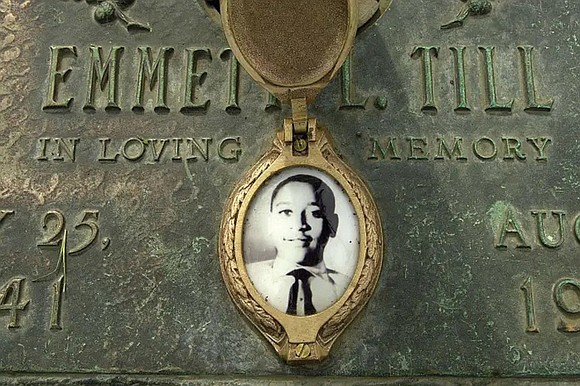For Emmett Till’s family, national monument proclamation cements his inclusion in the American story
Associated Press | 7/27/2023, 6 p.m.
When President Biden signed a proclamation Tuesday establishing a national monument honoring Emmett Till and his mother, Mamie Till-Mobley, it marked the fulfillment of a promise Till’s relatives made after his death 68 years ago.
The Black teenager from Chicago, whose abduction, torture and killing in Mississippi in 1955 helped propel the Civil Rights Movement, is now an American story, not just a civil rights story, said Mr. Till’s cousin the Rev. Wheeler Parker Jr.
“It has been quite a journey for me from the darkness to the light,” Mr. Parker said during a proclamation signing ceremony at the White House attended by dozens, including other family members, members of Congress and civil rights leaders.
“Back then in the darkness, I could never imagine the moment like this, standing in the light of wisdom, grace and deliverance,” he said.
With the stroke of President Biden’s pen, the Emmett Till and Mamie Till-Mobley National Monument, located across three sites in two states, became federally-protected places. Before signing the proclamation, the president said he marvels at the courage of the Till family to “find faith and purpose in pain.”
“Today, on what would have been Emmett’s 82nd birthday, we add another chapter in the story of remembrance and healing,” President Biden said.
It’s the fourth such designation by the Democratic president’s administration, reflecting its broader civil rights agenda, the White House said. The move comes as conservative leaders, mostly at the state and local levels, push legislation that limits the teaching of slavery and Black history in public schools.
House Democratic Leader Hakeem Jefferies said the monument “places the life and legacy of Emmett Till among our nation’s most treasured memorials.”
“Black history is American history,” he said in a written statement.
Mr. Till’s family members, along with a national organization seeking to preserve Black cultural heritage sites, say their work protecting the Till legacy continues. They hope to raise money to restore the sites and develop educational programming to support their inclusion in the National Park System.
President Biden’s proclamation protects places that are central to the story of Emmett Till’s life and death at age 14, the acquittal of his white killers by an all-white jury and his late mother’s activism.
In the summer of 1955, Mamie Till-Mobley put her son Emmett on a train to her native Mississippi, where he was to spend time with his uncle and his cousins. In the overnight hours of Aug. 28, 1955, Emmett was taken from his uncle’s home at gunpoint by two vengeful white men.
Emmett’s alleged crime? Flirting with the wife of one of his kidnappers.
Three days later, a fisherman on the Tallahatchie River discovered the teenager’s bloated corpse — one of his eyes was detached, an ear was missing, his head was shot and bashed in.
Mrs. Till-Mobley demanded that Emmett’s mutilated remains be taken back to Chicago for a public, open casket funeral that was attended by tens of thousands of people. Graphic images taken of Emmett’s remains, sanctioned by his mother, were published by Jet magazine and fueled the Civil Rights Movement.
At the trial of his killers in Mississippi, Mrs. Till-Mobley bravely took the witness stand to counter the perverse image of her son that defense attorneys had painted for jurors and trial watchers.
Altogether, the Till national monument will include 5.7 acres (2.3 hectares) of land and two historic buildings. The Mississippi sites are Graball Landing, the spot where Emmett’s body was pulled from the Tal- lahatchie River just outside of Glendora, Miss., and the Tallahatchie County Second District Courthouse in Sumner, Miss., where Emmett’s killers were tried.
At Graball Landing, a memorial sign installed in 2008 had been repeatedly stolen and was riddled with bullets. An inch-thick bulletproof sign was erected at the site in October 2019.
The Illinois site is Roberts Temple Church of God in Christ in Chicago, where Emmett’s funeral was held in September 1955.
“The truth should carry itself, but it doesn’t have wings. You have to put some wings on it.”







